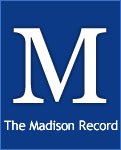
- Students involved in the project in Dr. Don Gregory's lab, testing a Pockels Cell electrooptic modulator for QKD switching applications. (L-R) Miles Gannet, Bradley Taul, Ella James, Caleb Bender and Zachary Houtman. Photo by Rainer Steinwandt / UAH
UAH leads NATO project to address impact of quantum technology on global security
HUNTSVILLE – Researchers at The University of Alabama in Huntsville (UAH), a part of the University of Alabama System, are leading a North Atlantic Treaty Organization (NATO) partnership to address emerging security challenges presented by quantum technologies.
Quantum computers exploit quantum phenomena to solve mathematical problems that are difficult or intractable for conventional computers, and these devices will someday be able to break many of the public-key cryptosystems currently in use, seriously compromising digital communications. To counter these threats, the multi-year initiative, funded under the NATO Science for Peace and Security Programme (NATO SPS), seeks to provide secure communications via classical and quantum technologies. The effort addresses such weighty topics as counter-terrorism, energy security, cyber defense, environmental security and defense against chemical, biological, radiological and nuclear agents.
“We are very excited to enable UAH students to work with this technology,” says UAH dean of the College of Science, Rainer Steinwandt. “The College of Science’s research capabilities and familiarity with the NATO SPS framework placed UAH in an excellent position to lead this multi-year effort.”
In May 2022, the White House released a national security memorandum promoting United States leadership in quantum computing while mitigating risks to vulnerable cryptographic systems. To that end, UAH is heading five institutions in four nations to support the initiative: the Slovak Academy of Sciences and Slovak University of Technology, both in Slovakia, as well as the Universidad Carlos III de Madrid in Spain and the VTT Technical Research Centre of Finland. The overall mission is to design, analyze and implement a cryptographic protocol for secure group communication on distributed hybrid networks.
“UAH is also in the fortunate position to be able to work on both technologies central to this project,” Steinwandt says. “Don Gregory in our Department of Physics and Astronomy is an expert in optics and leads our experimental work on quantum key distribution. And through my work, our Department of Mathematical Sciences contributes to the post-quantum cryptographic aspects of the project.”
The National Institute of Standards and Technology (NIST) is in the final stages of a standardization effort in post-quantum cryptography, as well. “For this NATO SPS effort, we have the NIST Post-Quantum Cryptography Standardization Project as one of our end-users,” Steinwandt notes.
The work places a special emphasis on training young scientists in post-quantum cryptography (PQC) and quantum key distribution (QKD) research. QKD is the science of exploiting quantum mechanical properties to perform cryptographic tasks, while PQC concerns the development of cryptographic algorithms that are secure against a cryptanalytic attack by a quantum computer.
“Quantum key distribution is currently at more of a research stage,” Steinwandt explains. “The National Security Agency states on its website that it ‘views quantum-resistant (or post-quantum) cryptography as a more cost effective and easily maintained solution than quantum key distribution.’ It makes sense to explore multiple pathways to deal with the threat of cryptanalytically relevant quantum computers. Research in quantum key distribution commonly happens in physics groups, whereas post-quantum cryptography is commonly closer to computer science and mathematics. So, we work across disciplines with the common goal of a quantum-safe communication infrastructure. We hope our project can contribute a flexible tool to achieve quantum-secure communication.”



